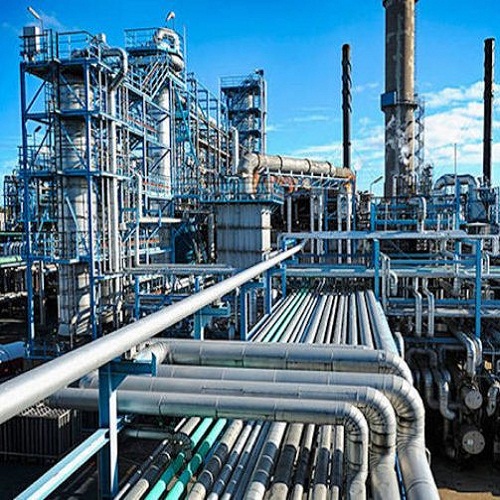For decades, Nigeria has attempted to revive its petroleum refineries without success, with billions of dollars going down the drain. Will the federal government’s renewed effort to get the assets to work again be another fruitless exercise or will it yield results this time?
Over the years, Nigeria succeeded in grounding all its three refineries and is today a net importer of all the refined products consumed in the country, with all its attendant negative economic and social impacts. There has rarely been any administration in recent times that did not sink billions of dollars into the facilities to turn them around, all meeting a dead end, leaving large sums of money down the drain as a consequence.
While a lot of Nigerians do not see any need for government to embark on this journey once again, having walked this path many times, this administration has fought back all forms of criticisms, insisting that it is the best line of action to take at this time.
From the high, the mighty, and the lowly, many Nigerians have expressed their reservations over the latest journey which will see Nigeria borrow massively to fix the facilities, before, according to the new plan, handing them over to private companies to manage. Will this be another exercise in futility?
A history waste
Depending on who is counting, Nigeria has four major existing refineries, including the old Port Harcourt refinery with a capacity of 60,000 barrels per day, commissioned in 1965, and the Warri Refining and Petrochemical Company (WRPC) with a capacity of 125,000 bpd, which was put to work in 1978.
In 1980, Nigeria added the Kaduna Refining and Petrochemical Company (KRPC), which is capable of refining 110,000 barrels per day, and then nine years later in 1989, floated the New Port Harcourt refinery with a total capacity of 150,000 bpd.
With a total installed capacity of 445,000 bpd, in the last two decades, the facilities have undergone serious degradation due to poor management and maintenance, with capacity utilisation as low as 15 percent and 25 percent every year.
While the country managed to source between 20 percent to 30 percent in the last couple of years, the refineries have now totally packed up, as all demand is now fully imported by the Nigerian National Petroleum Corporation (NNPC), through its subsidiary, the Petroleum Products Marketing Company (PPMC).
The decline in the performance of the local refineries, according to Anthony Ogbuigwe, writing in the Applied Petrochemical Research, volume 8, started in the early 1990s when the military government ordered NNPC to close its accounts in commercial banks and transfer them to the Central Bank. That singular decision, he argued, led to NNPC losing its autonomy.
Eventually, it became increasingly subjected to interference and control of politicians, with decisions on when to carry out turnaround maintenance and selection of contractors then being influenced by government, rather than by the professionals within the corporation.
Before they finally shut down, the nation’s four refineries were performing at a paltry 5.55 percent of their combined nameplate capacity of 445,000 barrels per day. But even today, Nigeria still spends roughly N10 billion on the refineries every month, even if they have not produced a drop of fuel for years, remaining a drain on the country’s purse.
In 2020, the NNPC published an audited financial report for the first time in its 43 years of operation. In 2018 alone, the report revealed that the refineries incurred a total loss of N154 billion, with the Port Harcourt refinery losing N45.59 billion, the Warri refinery about N44.44 billion, and the Kaduna refinery losing N64.34 billion.
Although actual figures are rarely available as many of the turnaround maintenance exercises were shrouded in secrecy, at least before now, it is estimated that about $25 billion may have gone down the drain fixing the intractable problem in the last 25 years.
The Nigerian Senate in an attempt to unravel the lingering challenge said that between 2013 and 2015 alone, over $396 million was expended on fixing refineries, with NNPC announcing a cumulative loss of N123.25 billion in 10 months from January to October 2019.
A fresh journey to nowhere?
Several experts have said that the best way to bring the refineries back to life is to sell them off to private investors. But despite that position, the federal government has ramped up its financial involvement in revamping the facilities, recently announcing that it was spending $1.5 billion on rehabilitating the Port Harcourt refinery.
To be overseen by Italy’s Tecnimont, the government stressed that it will be completed in three phases, with the first being within 18 months, which will take the refinery to 90 percent production capacity, while the second and final phases will be carried out within 24 months and 44 months respectively.
The refinery has three funding components, namely from the NNPC’s Internally Generated Revenue (IGR), budgetary allocations provisions, and loans from Afreximbank.
But this is not the first time Nigeria will be taking a huge decision on the operations of the refineries. To bring it home, recall that in the last days of the Olusegun Obasanjo presidency, he had succeeded in privatising the Port Harcourt refinery, but was reversed by President Umar Yar’Adua, resulting in another fruitless journey. It remains to be seen if the project will not be discontinued by the next administration.
Not a few believe that it is absurd to keep spending money without results and yet dig further into debt, even when it’s obvious that the country has fallen into a financial hole. Experts believe that it is better to climb out of the hole first, instead of sinking deeper.
Furthermore, questions have been raised as to how transparent the “open competitive bidding” for the project was, how many companies submitted bids and when the technical evaluation was done.
With the timelines for completion being 18, 28, and 44 months, after the government must have left power, it is further believed that the issue of accountability may have been thrown through the windows as the current government will not be around to take questions if the project fails.
Added to the earlier $1.5 billion, the Federal Executive Council (FEC) last Wednesday approved another contract for the award of contracts for the rehabilitation of Warri and Kaduna refineries to Messrs Saipem SPA and Saipem Contracting Limited at the combined sum of $1.484 billion.
According to the Minister of State, Petroleum, Timpre Sylva, the Warri refinery rehabilitation got $897,678,800, while Kaduna Refinery would cost $586,902,256, noting that the completion of the rehabilitation of the refineries would be in three phases.
“The first phase will be completed within 21 months. In 23 months, phase two will be completed and in 33 months, full rehabilitation will be completed,” he said.
What Some Nigerians think
At various times and in diverse forums, some Nigerians have expressed their opinions on the new drive and commitment of the government’s scarce resources to the project they see as a waste of public funds.
An oil and gas expert and former Chair of the Society of Petroleum Engineers (SPE), Joe Nwakwue, described it as a wrong step, arguing that if the country has not been able to run any commercial venture profitably, there’s no hope it will be different this time.
He called for privatisation of the refineries, using the most appropriate models, maintaining that private sector capital and operational control is the most promising option for the country.
In a separate forum, renowned economist, Prof. Pat Utomi, said the rehabilitation amounted to a waste of resources, arguing that other areas are begging for government attention but certainly not the rehabilitation of an asset already earmarked for sale.
“The decision of the federal government to invest $1.5billion in the repair of Port Harcourt refinery is unwise, unreasonable and has no basis,” he stated
In the same vein, the immediate past Director-General of the Lagos Chamber of Commerce and Industry (LCCI), Dr. Muda Yusuf, argued that the government has no business putting more money into the Port Harcourt refinery, while Dr. Olanrewaju Aladeitan, a lecturer at the University of Abuja faulted government’s action, saying it is one step forward and three steps backward.
In addition, one of the earliest reactions was from economist and founder of Stanbic IBTC Bank Plc, Atedo Peterside, who said the NNPC would only “enmesh Nigeria into a deeper financial mess by throwing $1.5 billion (including debt) at a problem it created” and recommended an end to the ‘nightmare’ through a Bureau of Public Enterprise (BPE) core investor sale.
According to him, going ahead with the project amounts to “mortgaging the future of our children and grandchildren in the hands of people who have not shown that they can manage anything.”
Also, former Vice President Atiku Abubakar had asked the government to urgently “privatise our refineries and the NNPC through the time-tested Nigeria LNG model in which the federal government owns 49 percent equity and the private sector controls 51 percent.”
“In 20 years ending 2020, the NLNG had delivered $18.3 billion dividends to government irrespective of taxes and other benefit accruals to the country. This will not only free the government of needless spending but also clean up the infrastructure mess in the petroleum downstream sector,” he had argued.
NNPC defends position
Although some Nigerians have maintained that the funds being sunk into revamping the refineries would be enough to build new ones, the NNPC argues that the country does not have the financial muscle now to build new ones.
It further noted that petroleum refining as a business is too important to be left in private hands entirely because of its security implications.
NNPC Group Managing Director, Mele Kyari, said building a new refinery now would cost the country about $10 billion which is far beyond the $1.5 billion earmarked for the rehabilitation of the Port Harcourt refinery.
He also said the country would have to live with the importation of petroleum products, especially petrol, for another four years if the country ventures into building a new refinery.
“We have people saying why not build a new one; why will you repair an old refinery with $1.5 billion? The fact is available even by Google search, what it takes to build a refinery of this status today.
“It will be difficult for the country to build a new refinery as it will take four years for it to commence production. It is around $7 billion and $12 billion to construct a refinery of this nature (Port Harcourt refinery).
“This is the estimate you see in public space and there are things you do outside the construction limits like the utilities that are never accounted for when estimates of this nature are done.
“Typically, there is an additional 25 percent cost for construction limits, so, when you say a refinery can be built at $7 billion or even $10 billion, also think of that 25 percent.
“With today’s estimate, you cannot build a refinery at any cost below these amounts, that means that the option you have is to scrap this and build a new one, and we all know that we don’t have that resource.
“If we start a new refinery of this nature today, it can’t work in less than four years, therefore, it means we will continue to import petroleum products in the next four years or more,” Kyari argued.
He admitted that the huge cost of rehabilitation of the refinery witnessed in this present time is a result of poor maintenance of the plant over some time, stressing that due process was followed in arriving at all the decisions taken so far.
“What we are seeing today is the cumulative effect of our lack of doing proper maintenance over some time but something has changed today and this is why we are proud to tell Nigerians that we have done something different in the background.
“This is because we have a government that allowed us to play our role without interference in terms of our procurement exercises and this made the process go unhindered.
“This has also allowed us to involve every stakeholder including NUPENG and NEITI, to ensure openness and accountability of the process,” he said.
It’s been decades of broken promises, huge economic losses, erosion of its international prestige as a major oil-producing country importing all its products, and billions of dollars that are left unaccounted for. Will this new move also fail? Hopefully, this question will be answered in some months from now.
Source: Thisday










